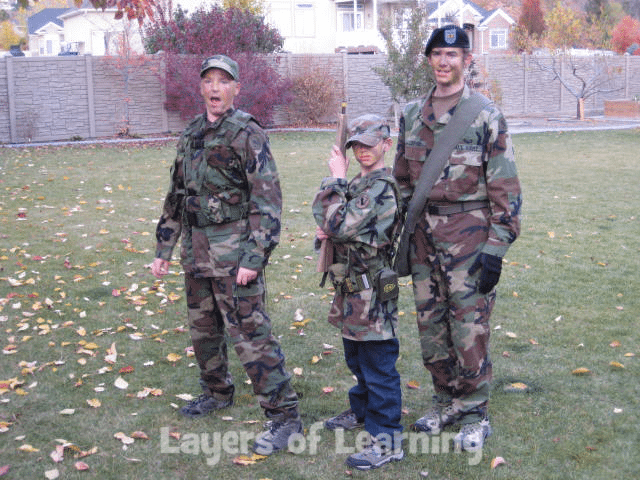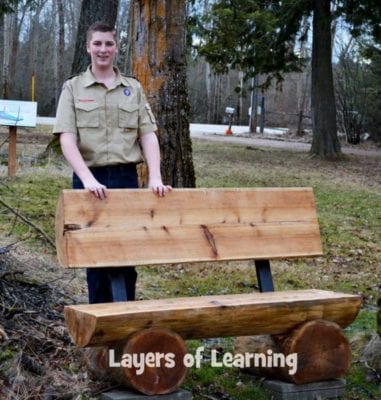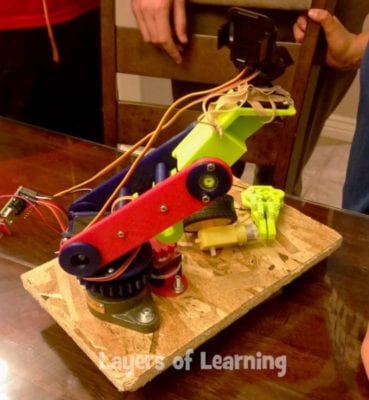Homeschooling in high school is a whole new ball park. Even seasoned homeschool moms question whether or not it’s a good idea. Not only are the subjects and material more advanced, but the stakes are higher and more long term. What kids do in high school can be a slingshot for future college paths, careers, and life choices. But no need to fear, in a lot of ways homeschooling in high school is even easier than the earlier grades.
Hopefully your high school kid is already a pretty independent learner. He or she is more mature now too, and can handle more of the responsibility. And if good study habits are already in place, it makes these years smooth.
Independence with a Disclaimer
“Independent learner” doesn’t mean your little darling takes complete control of his education and you can check out, but it does mean you can trust him to complete the tasks you’ve set for the day. Then of course you have to relentlessly check up daily. Some kids, for a variety of reasons, may not be all that independent during the high school years. My second son, plagued with ADD, never could make it through a math lesson without me sitting there over him. It’s extremely annoying and even damaging, especially if you have younger kids also. So make a real effort to train them during the tweens. But then, remember, vigilance!
A Change in Focus
There will likely be some changes in the way you homeschool though. Homeschooling in high school should be a time of great depth of learning. Teens should be reading the classics, learning a foreign language, pursuing personal interests, developing skills that will help them become independent adults, and learning to write and speak articulately and thoughtfully.
Although we promote a family style school, our high schoolers work more independently. They are more focused on the reading and writing portions of our subjects than hands-on projects. Our teens are developing skills in synthesizing information, forming opinions, and communication, both written and verbal. They also do more work using computers and individual research and spend more time on math and science than before. They are preparing to take formal tests.
We also shift our focus to learning life skills that they will be using in only a few short years when they are on their own – everything from filling out a medical history to managing finances and cooking meals. They need to know when to get an oil change, sort the whites and colors in the laundry, and how to write a resume. Their skills should include being able to type quickly, find a good doctor, and figure out if they can really afford that car they are eyeing. They should also make sure they are prepared for college or a vocation and independent life by learning good study skills, note taking, and testing preparation (the SAT can be intimidating!).
Planning For The Future
Before your child starts high school, sit down together and discuss future plans. Make decisions together about whether or not the GED or a diploma is important. Talk about dreams and goals and map out how to reach them. Make sure you know what is required to get to those goals. For example, if your child wants attend a certain college, contact the admissions office and find out what the application requirements are. People who want to join the military must have a GED or high school diploma. At this point in life, it’s not ALL just about love of learning anymore. There are actual requirements, and we need to meet them. So find out what college or career paths interest your teen and let that guide your decisions. We will discuss more specifics about that in the next section – Grades, Transcripts, and Getting Into College.
Local High School Requirements
You need to know what is required for graduation in your state and possibly in your local school district. Karen and I approach this differently because of our different personalities and our kids different personalities. Karen and her kids are a lot more extroverted (like a lot) than me and my kids. So I thought here it would be useful if you could see both of our approaches.
Karen’s Approach
One of the best things I did when my son began homeschool high school is walk into our local PS and talk with a school counselor. She was incredibly kind and walked me through our state graduation requirements as well as what local colleges are looking for. I learned the specifics about each school subject and how many credits are required, including labs for science courses, and what qualified as a P.E. credit, and how many semesters of foreign language classes were required by universities in our state. She offered lots of advice and support. I left her office with a packet of information about what courses high schoolers typically take and felt empowered to set a course.
The best part to me was realizing that we were over prepared for graduation. I could relax. Kids only need two science courses, no foreign language, only up through Algebra 2, and so on. We plan to do more than that, but my stresses that we weren’t going to be able to meet requirements were gone.
Our son is not enrolled at the local school, but we have worked hard to always have a good relationship with whatever school district we reside in. We have our kids participate in school sports, orchestras, and other activities. We have also been willing to help with food drives and fundraisers. I take the approach that I care about the education of every child, not just my own. I choose to homeschool because I love it, but I also love how hard teachers work and want to support every form of positive education. Because of that attitude, I’ve had access to school libraries, field trips, and after school programs over our years as homeschoolers. Working with the school has served our family well, even though we’ve always been full-time homeschoolers.

Michelle’s Approach
I went online during the summer before my oldest son’s freshman year and checked out the graduation requirements in Idaho. Then I honestly never thought much about them again from that point. We had every intention of far exceeding the public school requirements.
I also went online to the websites of several universities and colleges that I thought my son might possibly be interested in sometime down the road and found out what their requirements were. To me, these requirements were far more important than high school graduation requirements. I just made sure that we met the requirements.
For us, the possibility of military enlistment or ROTC has always been real. My husband served in the military. So I also took pains to look up military requirements.

The academic requirements are pretty consistent across most universities but the ways that they each handle homeschool applications can differ dramatically. It’s important to know if your child will need essays, portfolios, outside teachers who can assess him, and so on.
Like Karen, I wholeheartedly support teachers and schools, but our local public school isn’t very friendly to homeschoolers (that climate is slowly changing as they realize that attracting homeschoolers can equal $$$). We also live a half hour from the local high school and so my kids had never been involved in any way with the local school.
Then my second son began to show interest in auto mechanics. So we enrolled him in a local high school tech school.
It’s a good idea to be aware that in most places in the United States you can enroll your kids in just part of the school environment. Need high school math classes? You can just enroll in that one hour a day if you want.
Our Course
Just before each child’s freshman year we map out a high school plan, selecting a math, English, history, geography, science, art, foreign language, and elective component for each semester. Finally, we add a component for the student’s chosen career path. That career may change, but it’s what he or she is excited about right now, and kids learn more willingly about things that excite them.
We also make a list of other experiences to include in high school, including clubs, sports, and service opportunities.
Extra activities include things like this:
- Orchestra/band/choir
- Local community theater
- 4-H
- Scouts
- Community or school sports programs
- Involvement in a church
- Art classes or workshops
- Adopt-A-Highway programs
- Working at shelters and food banks
- Food drives, fundraisers, and awareness events
- Building for Habitat for Humanity
- Volunteering in local events like 5K races, holiday concerts, or library storytimes
- Entrepreneurial endeavors
- Scholastic clubs – spelling bees, history day, or government courses
- Trips to places in the world
- Jobs

You won’t do all of these things, but there is a lot more to developing a teenager than just school subjects. These are the years that shape a worldview, and filling teens’ time with positive, contributing activities is beneficial. Plus, you don’t want to end high school with a blank resume and nothing to put on college applications.
Creating that map will help you see how the components of a high school education fit into place. You can use this printable to create your map.
Mentors
Another powerful tool to have in high school is a mentor. Mentors are people who can help your kid develop their talents and interests. Often you have to search out these opportunities. If your kid wants to be a dentist, mention it at the next dentist appointment and find out if she could possibly come find out more about it. We know high school aged homeschoolers who are working or volunteering in dentist’s offices, veterinary clinics, and local elementary schools. A friend of ours has mentored our sons and taught them forging. Our son is learning auto mechanics and is rebuilding a car with his grandpa. My brother is a computer programmer who is teaching several of his nephews and nieces to program, work with robotics, and 3-D design.
Find mentors if you possibly can. At this age especially your sons and daughters need influential adults in their lives who are not their parents.

Cooking, art, music, politics, law, medicine, business, — there are people in the world who not only work at these jobs, but love what they do. And if they are willing to be a mentor, you’ll likely watch your child blossom.
Teaching What You Don’t Know
You may worry about teaching your high schooler things that you can’t remember or never learned – calculus, chemistry, physics, or others – but before you give up, look for resources. There are awesome online classes and tutorials. Many libraries and college campuses have free or inexpensive tutoring services. There may be opportunities for dual enrollment at local high schools or colleges for the tougher subjects. And your kid may just surprise you too. Math and science texts for high schoolers are very well written, and a motivated teen may be able to work through the material very independently.
There is another option as well, which is the approach we’ve taken. Although it’s been enough years that I can’t recall the details of having learned these tougher subjects, I want to be a student with my kids, so I sit and read the lessons and work the problems right alongside my teens. I’m learning it all better than I ever did before. Your ability to do this will likely depend on the ages of your other kids.
More Than Just Classes
There is more to high school than just school. There are senior trips, graduation, junior prom, homecoming games, and other experiences. These may or may not be important to your kids, but you should at least talk about it together and decide if they are. High school is a kind of rite of passage for many of us, and you need to make sure your teen’s needs are met. The options will be different depending on your family and where you live.
Again, Karen has very social kids and I do not so we’ve approached this very differently. Here’s a view into each of our styles.
Karen’s Approach
My kids are very social. They love dances, football games, getting together with friends and the whole teen scene. I also love holidays, making a big deal of things, and putting my kids in the spotlight (they eat it up). So this is how I have met those needs.
- Our church puts on their own “Prom” and invites teens from several neighboring cities to join, and that has been a good substitute.
- We plan a family trip to a spot of the kid’s choice before high school graduation.
- As a family, we attend a lot of high school sporting events and are involved in high school activities at our local ps, even though we don’t take classes there, so no need to miss the big game.
- I make sure that all of our junior high and high school aged kids get an ASB card so they can attend events as desired with friends too.
These things have been enough for our kids. The trip is a really big deal and a focus, and they have a lot of social opportunities, so they feel like a part of things even though they aren’t sitting in math class at the local PS.
Michelle’s Approach
Then there’s my kids. I almost have to pry them from the house with a crow bar. I’m also a home body and holidays and events are meh, to me. Still, memories must be made and the kids do need to socialize. So here’s what I do.
- I make my kids attend some of the church sponsored dances. As they get older they usually start to want to. We don’t put any emphasis on “Prom” per se but if they want to go I do spring for a new tie and a suit.
Yep, that’s about it.
We didn’t even do anything at all when our two oldest graduated following a nebulous period of half college and half homeschool stuff. I do seem to vaguely remember giving the oldest a new laptop as a graduation gift.
If my kids were really interested I would facilitate them going to other events, but they’re not. Most of their friends are either other homeschooled kids or not in their peer group.
It’s fine if your kids aren’t social butterflies, cruising around town with, um, whoever. It’s also fine if they are. The point is that homeschooling shouldn’t put much of a damper on your lifestyle. In fact, it leaves you with more choices than traditional schooling.
A Few More Thoughts
Homeschooling in high school can have huge pay-offs if you take the time to plan it out thoughtfully and do it right. Homeschoolers tend to be more prepared for college than public schooled kids because of their work ethic, study habits, individualized instruction, and preparation. These can be some of the most rewarding years in your homeschool.
Read on to learn more about grades, transcripts, and getting into college.
Free Samples
Try family-style homeschooling now with free samples of four Layers of Learning units when you subscribe. You'll get to try family-style history, geography, science, and arts with your children.
You can unsubscribe any time.




I wish I could find church sponsored dances. Do only Mormons have church dances in Idaho and Utah? We live in the Northeast, and no one seems to do church dances around here.
I have no idea what resources are available in your area. If there aren’t any church dances where you live you could contact your church leadership and make a suggestion to start up dances. We like the church dances because the environment, music, clothing, and behavior is far superior to that found at school dances.
Mormon congregations generally have what they call “stake dances” for youth everywhere the church has a presence. Non-member youth are welcome to attend these events.